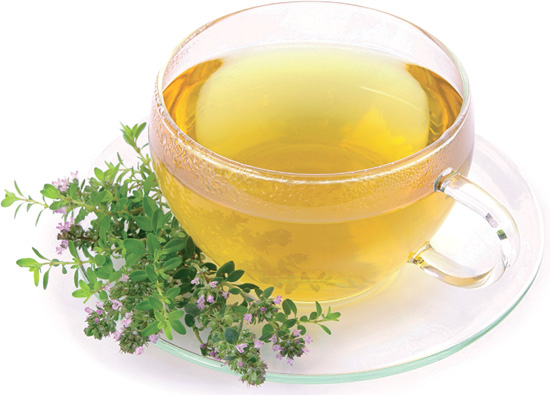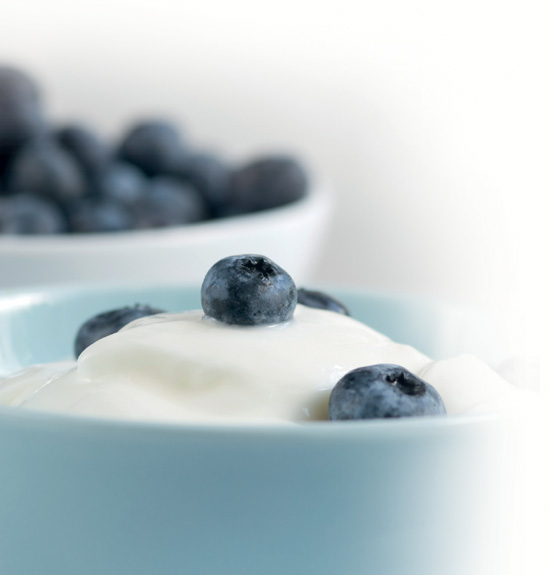
Whether the cause of your discomfort is yesterday’s lunch special or a viral infection, “Montezuma’s revenge” can be most unpleasant. But it is also extremely effective at expelling whatever it is that ails you. Rather than trying to halt the condition immediately, it is now considered better to allow it to run its course. Start eating—plain food, little and often—when your appetite returns.
When diarrhea strikes, drink plenty of clear liquid (including rehydration fluids) to replace the lost water and the salts essential for retaining water in the body.
Thyme tea
This traditional remedy can ease the unpleasant stomach cramps that often accompany diarrhea.
1/2 teaspoon (2 ml) dried thyme
1 cup (250 ml) boiling water
Infuse the dried plant for 5 minutes and strain. Drink three cups a day.
• Sip noncarbonated mineral water or black tea flavored with sugar and a pinch of salt.
• Buy a pack of special glucose–electrolyte mixtures from a pharmacy to offset salt loss. These solutions are especially important for children, pregnant women and older people for whom major fluid loss is particularly dangerous.
• Make your own electrolyte solution: Mix 2 cups (500 ml) noncarbonated mineral water with 7 teaspoons (35 ml) sugar, 1 teaspoon (5 ml) salt and 2 cups (500 ml) orange juice or fruit tea to provide potassium and flavoring. Drink throughout the day.
• Drink at least 1 cup (250 ml) tea three times a day. Tea made from catnip or raspberry leaves contain tannins that have a soothing effect on the intestines.
WHEN TO CONSULT A DOCTOR Infants and small children with diarrhea should see a doctor right away. Adults should seek medical treatment if the diarrhea continues for more than 3 days.
If diarrhea persists for a day or two, it’s important to restore a healthy balance to the intestinal flora. There are plenty of long-standing home remedies available for this purpose.
• Slippery elm powder soothes the inflamed lining of the digestive tract. Take 1 teaspoon (5 ml) daily.
• Eat yogurt, which contains “good bacteria,” to combat any harmful bacteria that may have caused diarrhea in the first place. Replacing them can help you feel better faster. Look for yogurt that contains live bacterial cultures or probiotics. It must be a product with billions of bacteria in it, as you will need this many to recolonize your intestines.
• Eating 1–2 teaspoons (5–10 ml) dried blueberries is a time-honored Swedish cure for diarrhea. The berries act as an astringent, contracting tissue, reducing inflammation in the intestine and ultimately slowing diarrhea.
• Dark chocolate contains a high percentage of cocoa and flavonoids that ease diarrhea.
• Apply a little heat. Heat calms the intestine and makes you feel better. A hot water bottle or a warmed wheat bag should do the trick.
• Boil two handfuls of fresh calendula flowers in water, strain, place the flowers into a cloth bag and put it on your stomach. Test it with a fingertip first to make sure that it’s not too hot.
• Calm your nerves. Nervous diarrhea can be treated with aromatherapy massage. Mix 3–4 drops of chamomile, sandalwood, juniper or lavender oil with 2 teaspoons (10 ml) almond oil and massage your lower abdomen clockwise.
When diarrhea subsides, gradually return to a normal diet. Start with low-fiber foods such as crackers, toast, rice, boiled potatoes and chicken. Doctors will often recommend a diet of bananas, rice, applesauce and toast, also known as the BRAT diet. These binding foods are suggested as the first to try after an episode of diarrhea. Applesauce contains pectin and other nutrients your body needs and because the apples are cooked, they are easier to digest. Bananas are easily digested and contain high levels of potassium, which helps to replace the electrolytes you lose when you have diarrhea.
• Next, treat yourself to a clear vegetable broth or a potato and carrot soup (see below for the recipe) and dry toast.
• Try some cooked carrots, which are also high in pectin—boil or roast and purée.
• Gradually broaden your menu with a little fat and easily digestible protein.
• Avoid milk and dairy products until symptoms stop. Some of the organisms that cause diarrhea can temporarily impair the ability to digest milk.
• During this time, avoid coffee and alcohol. Instead, treat yourself to a cup of peppermint tea, which can help to soothe the intestines.
Potato and carrot soup
This soup delivers fluid and minerals without further irritating the intestinal mucous membrane.
1 cup (250 ml) water
2 medium potatoes
1 carrot
1 pinch salt
Bring the water to the boil. Add the peeled and chopped vegetables. Cook over a low heat until tender, then purée and season with the salt.

EAT PLAIN yogurt to help to RESTORE “GOOD” BACTERIA.